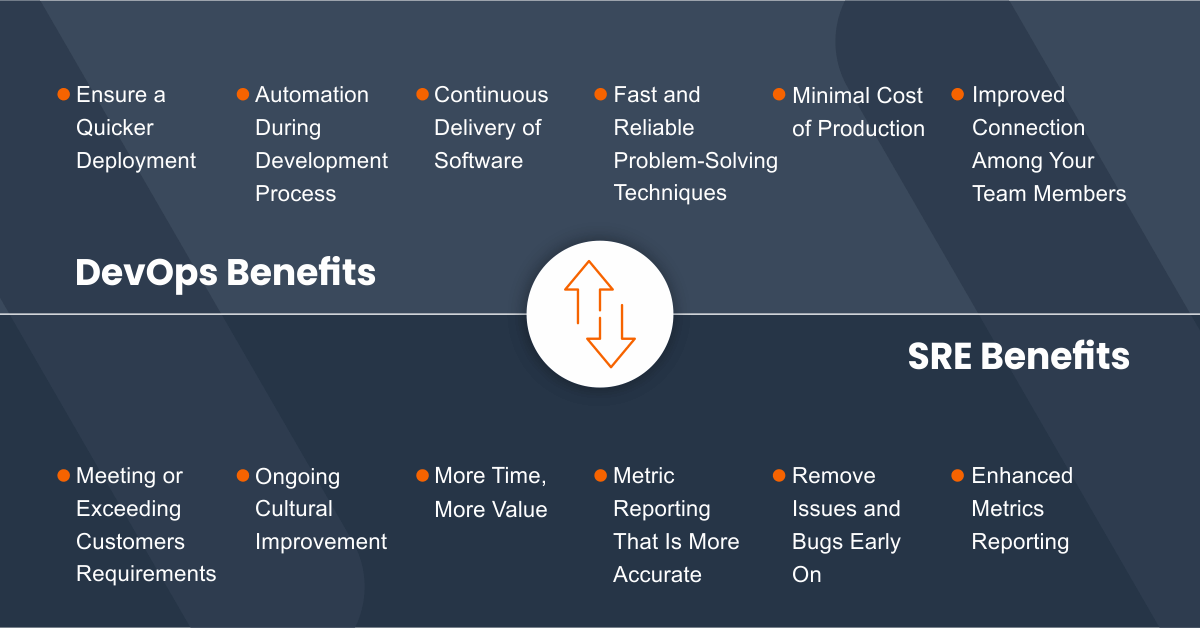Blog
Do you know how your business benefits through site reliability engineering or SRE? SRE is a very effective and valuable software engineering practice for IT operations. The SRE teams using this approach utilize software as a tool in order to manage systems, automate operations tasks and solve problems.
The concept of SRE originated at Google in 2003, and its credit goes to Ben Treynor Sloss. He was the originator of the term SRE, who handled a production team of seven engineers. Ben Treynor asked his team members to spend half of their time on operations tasks. It helps the team to get a better understanding of how to develop software. Besides, it helped him to complete tasks successfully.
A site reliability engineer (SRE) acts as a link between development and IT operations and performs the duties normally done by the operations. Usually, these engineers use automation technologies to solve problems by developing scalable and trustworthy software systems. The primary goal of SRE is to create software systems and automated solutions for operational issues. As a result, SRE performs the work traditionally performed by operations. They utilize engineers with software expertise to solve complex problems.
The main role of SRE teams is writing and developing code to automate processes like analyzing logs, testing production environments, and responding to issues. The engineer who uses this approach will become an expert in writing code. It also allows developers to focus solely on feature development and bring new features to production. An SRE can automate solutions to any recurring problem and reduce the workload of the operations team.
Roles and Responsibilities of an SRE
Your business can improve by using the concept of SRE. An organization can improve its people, processes, and technology with the service of site reliability engineers. They work based on the SRE principle in order to develop highly reliable software systems and solve operation and IT issues. SRE teams also provide numerous benefits in terms of speed and reliability, whether they adopted a full-fledged DevOps culture or tried to do so.
Your business can improve by using the concept of SRE. An organization can improve its people, processes, and technology with the service of site reliability engineers. They work as per the SRE principle to develop highly reliable software systems and solve operation, and IT issues. SRE teams also provide numerous benefits in terms of speed and reliability, whether they adopted a full-fledged DevOps culture or tried to do so.
DevOps – A set of software development practices
DevOps is a combination of two words, development and operations. It is a set of software development practices that focus on collaboration between the Development and Operations Team. A DevOps engineer can develop and deliver software faster with a low failure rate.
DevOps Engineer v/s Site Reliability Engineer
SRE and DevOps seem to be two sides of the same coin. Both activities are aimed at bridging the gap between development and operations teams. They have the common goal of improving the release cycle without compromising quality. A site reliability engineer and a DevOps engineer have similar tasks and responsibilities. However, there is a critical and nuanced distinction between the roles of DevOps and site reliability engineers.
DevOps engineers concentrate on developer velocity and continuous delivery, whereas site reliability engineers focus on software automation and dependability. The role of a site reliability engineer includes more than just automating and guaranteeing system stability.
Engineers and project managers must measure and quantify everything according to the basic concepts of DevOps. SRE addresses operations as a software problem and provides clear and concrete metrics for availability, uptime, outages, and labor to accomplish this.
On the other hand, DevOps-adopting firms prioritize breaking down organizational silos. By applying the same methods and approaches across the stack, site reliability engineering assists them in achieving this aim.
SRE must spend more time programming when compared to DevOps engineers. DevOps engineers spend more time with CI/CD tools such as Git, Ansible, Maven, Jenkins, Kubernetes, and Docker to automate software builds, tests, and deployments.
SRE ensures that binaries and configurations are appropriate for integration and deployment in various environments.
- SRE creates code and manages automation configurations.
- DevOps engineer configures, supports, and documents infrastructure components.
- SRE needs to resolve problems, monitor the software infrastructure, and track and solve tickets.
- DevOps engineer implements and manages cluster environments.
- SRE Software deployments with immutable infrastructure must be planned using CI/CD.
- DevOps engineer makes it as simple as feasible for the development team to create and distribute software.
- DevOps engineer creates workflows for projects to support CI/CD.
- DevOps Engineer creates and sustains virtual environments in various ways (VMs, Containers).












